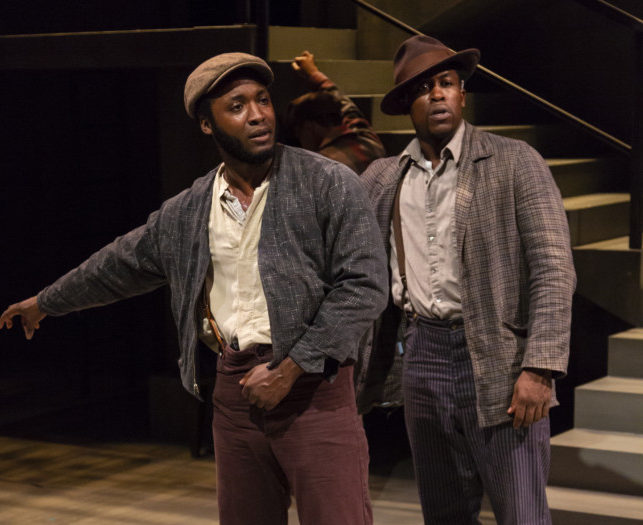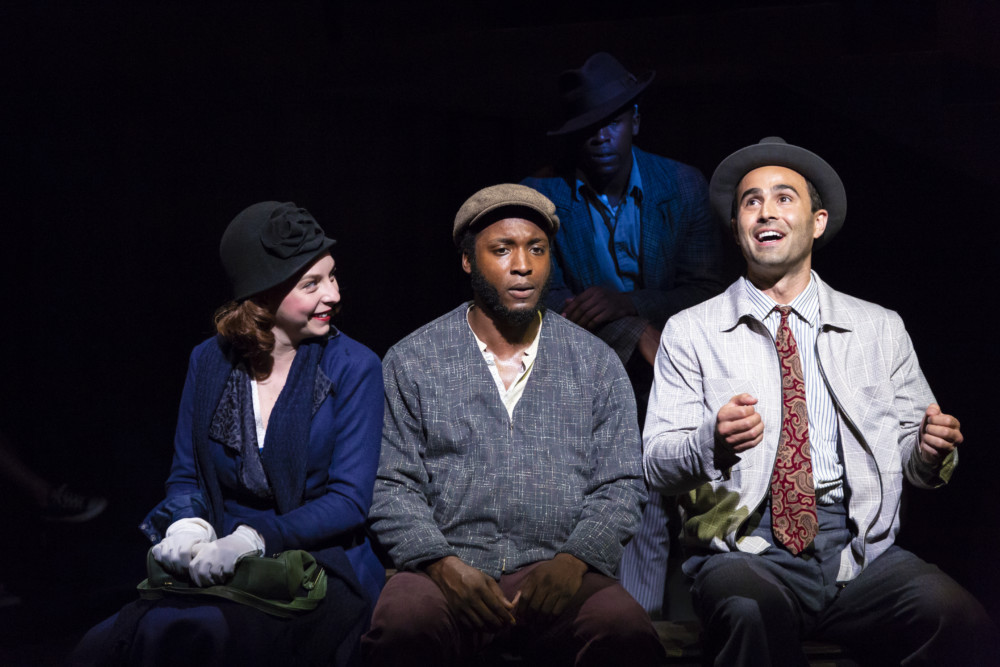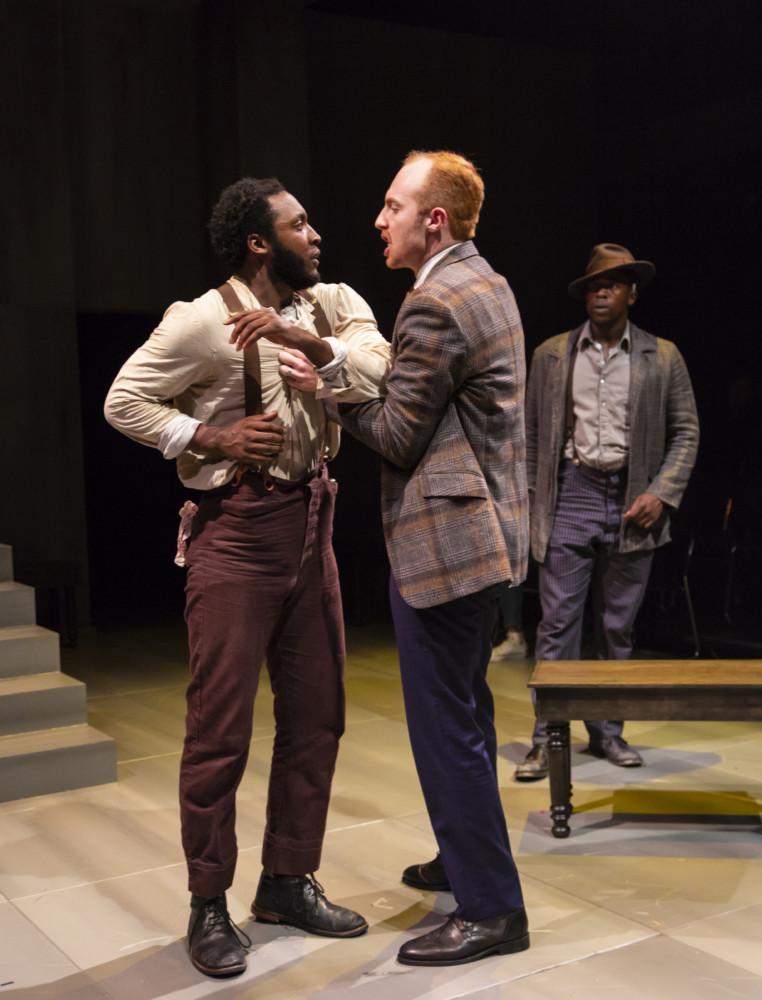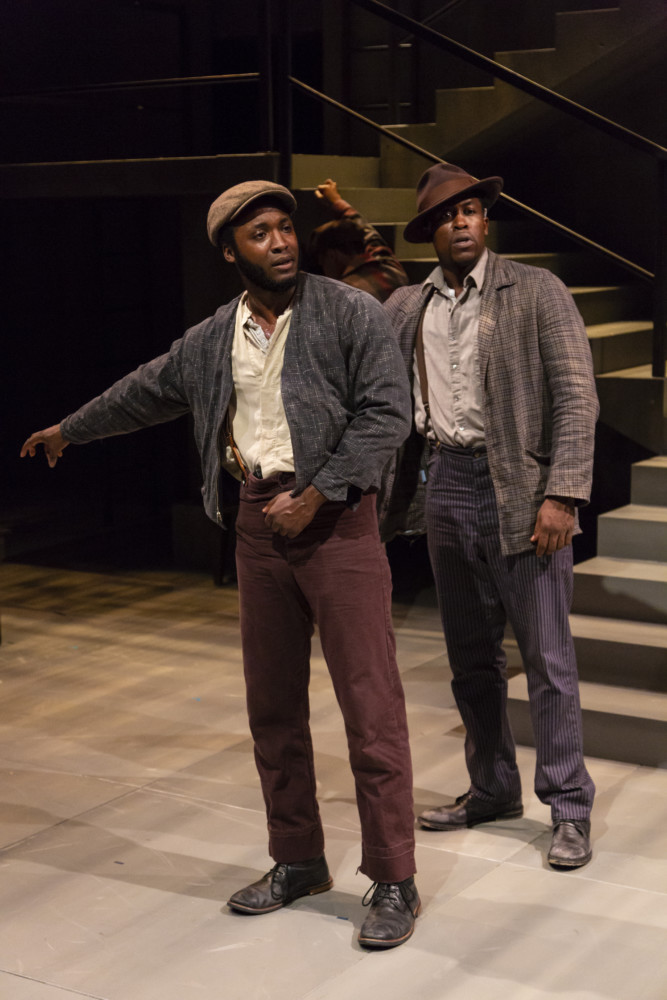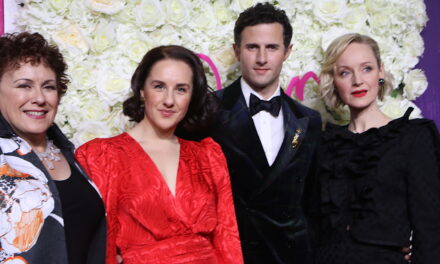by Carole Di Tosti
The Acting Company this season is performing two plays in repertory: William Shakespeare’s Measure for Measure and Native Son (1939) by Richard Wright. Native Son is the titular classic about a poor black man trying to find his way to survival on Chicago’s south side. The superb cast portrays the characters in both works which have been paired because their themes present critical and timeless social issues.
In the astounding production of Native Son, playwright Nambi E. Kelley’s adaptation of the characters, plot and devastating themes of the novel dispel any thought that Wright’s complex excoriation of racism in America makes the protagonist Bigger Thomas a stereotype. Kelley adroitly reworks the characterizations and arc of development placing all in Thomas’ mind. She does this to emphasize W.E.B. Dubois’ analysis of black experience in America. African Americans exist in a double consciousness which is necessary to live in a poisonous culture of racial animus.
In her work Kelley clearly reveals how Thomas is driven to commit crimes through his unconscious response to a society which despises him and usurps his goodness. Through his attempt to escape the demeaning mental, social and emotional enslavement that the culture would force on him, he commits identity suicide. He effects the self-fulfilling prophecy of becoming exactly what the culture perceives him to be. Ultimately, he destroys himself as the culture predicts and encourages him to do.
Kelley configures Thomas as a whole being, not just an external individual based on his demographics one might easily fill in on an American citizen census form. She reveals his internal psyche, emotional being, the inner consciousness of Thomas who is hyper-aware. She executes this brilliantly by suspending chronological aspects of time, place and space. The action occurs in Thomas’ mind. Through flashback and flash forward, memories are relayed. The scenes symbolize moments in Thomas’ intellect where he reflects and relives for a split second the events during the last years of his life. These “seconds” reveal his emotional and mental state. Thomas’s condition is one of chronic mental and emotional pain, self-torment and self-condemnation
As a result, Thomas attempts to find ways to free himself from the bigoted institutions that he feels have been constructed to inexorably siphon his spirit, soul, self-determination and ultimately exterminate his life, with impunity, while rendering him invisible in the process.
Kelley’s incredible portrait of Bigger Thomas is spun into irrevocable motion through the marvelous staging, direction (Seret Scott) and teasing out of superior portrayals by Jason Bowen and Galen Ryan Kane. With precision and authenticity both deliver the truth of Bigger Thomas’ poignant plight. We empathize with Bowen’s Black Rat and Kane’s Thomas and understand through their portrayals the emotional power inherent in every human being to cry out to their creator for justice and rectitude against those who take away opportunities to experience one’s inalienable rights to “life, liberty and happiness.”
Jason Bowen as Black Rat (the culture’s discriminatory stereotype of black men, Bigger’s alter ego, creating his double consciousness) portrays Thomas’ hopeless inner self. With insightful and exciting direction by Seret Scott, Black Rat shadows Thomas especially after he unintentionally commits manslaughter out of fear of being discovered with Mary Dalton (the excellent Rebekah Brockman) who takes liberties with Thomas that she shouldn’t. Together, Black Rat and Thomas masochistically march into actions that inevitably result in Thomas’ destruction.
Galen Ryan Kane’s Bigger attempts to escape his fate, but can’t. Black Rat reveals throughout the production, Bigger has internalized the culture’s racist definition of him. Thus, he manifests this identity because he has been brainwashed to believe he embodies the hideous attributes of a menacing rat which must be exterminated. In a genius stroke of Wright’s/Kelley’s irony and metaphor, Bigger kills a large black rat terrorizing his family (in his slum lord apartment). In his being he becomes the black rat he once killed. It is no wonder that he later commits crimes that will end in his infamy and the death penalty. The rat as an identity African Americans are bludgeoned to believe about themselves is an overarching symbol and theme that has particular currency today.
The ensemble—Anthony Bowden, Rosalyn Coleman, Laura Gragtmans, Lorenzo Jackson, Henry Jenkinson, Keshav Moodliar and Katherine Renee Turner—are uniformly brilliant as is the evocation, stylization and artistic rendering of this gobsmacking must see production which is enjoying its New York City premiere.
Native Son. Through August 24 at The Duke on 42nd Street (229 West 42nd Street, between Seventh and Eighth Avenues). www.theactingcompany.org
Photos: T. Charles Erickson


